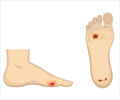Diethylcarbamazine Medication Information
Discover comprehensive details about Diethylcarbamazine, including its pronunciation, uses, dosage instructions, indications, and guidelines on how and when to take it or avoid it.
The updated prescription information covers potential side effects, precautions, warnings, and storage recommendations.
Additionally, explore the Diethylcarbamazine brands available in India and internationally, along with pricing information. For personalized advice, consult your healthcare provider.
Generic Name : Diethylcarbamazine Pronunciation : dye-eth-il-kar-BAM-a-zeen Therapeutic Classification : AntihelminticsBrand Names or Trade Names of Diethylcarbamazine
India :
Overview of Diethylcarbamazine
Diethylcarbamazine is used for treating filariasis which is caused by certain worm infestations such as Wucheria bancrofti, Brugia malayi, Brugia timori or Loa loa.Why is Diethylcarbamazine Prescribed? (Indications)
Diethylcarbamazine (DEC) is an antihelmintic drug which is prescribed to kill worms and treat the following diseases:a)Bancroft’s filariasis
b)Tropical pulmonary eosinophilia
c)Loiasis for the treatment, as well as to prevent infection in visitors to endemic areas
• Though it is effective in river blindness (Onchocerciasis), DEC is no longer preferred since it can cause a severe reaction called Mazzoti reaction, and ivermectin is a much better choice
When should Diethylcarbamazine not be taken? (Contraindications)
• DEC should be avoided in pregnancy, kidney impairment, and in patients with a previous history of heart disease.What is the dosage of Diethylcarbamazine?
• The dosage is determined based on body weight. Treatment is usually begun with a low dose.a) For the treatment of Bancroft’s filariasis:
The recommended adult dose is 2 to 3 mg per kg of body weight three times a day for 12 days.
b) For the treatment of eosinophilic lung:
The usual adult dose is 6 mg per kg of body weight daily for four to seven days.
c) For the treatment of Loiasis:
The usual dose is 2 to 3 mg per kg three times daily for 18 days.
d) Prevention of loiasis:
The usual dose in adults is 300 mg once a week
How should Diethylcarbamazine be taken?
• Diethylcarbamazine comes as a tablet and to be taken immediately after meals.What are the warnings and precautions for Diethylcarbamazine?
•DEC should not to be used to treat tapeworm or pinworm infestations as it is ineffective in these cases.Asthma may be worsened in patients who suffer from airway disease a few hours after the first dose but the adverse effect usually decreases after a few days.
Accumulation of the drug is observed when repeated doses are administered.
What are the side effects of Diethylcarbamazine?
Central nervous system: Headache, encephalitis (inflammation of the brain)Cardio vascular system: Increase in heart rate, low blood pressure resulting in dizziness
Musculoskeletal: Muscle and joint pain
Eye: Retinal hemorrhage (bleed in the inner light-sensitive layer of the eye), vision problems
Skin: Itching, rashes
Others: Nausea, vomiting, loss of appetite, chills and fever
What are the other precautions for Diethylcarbamazine?
• In severe cases, convulsions may occur which can be treated by diazepam.• Urine samples should be monitored as loss of protein in the urine may occur.
• Due to the destruction of the microfilariae parasite, a reaction which includes fever, headache, dizziness and asthmatic attacks may occur. It can be managed by either reducing the dosage or stopping the treatment temporarily.
• It can also be prevented with pretreatment with corticosteroids such as dexamethasone, 2 to 4 mg twice a day.
What are the Drug Interactions of Diethylcarbamazine?
• There are no significant drug interactions reported with this drug, however, caution should be exercised when it is administered with any other drug.What are the storage conditions for Diethylcarbamazine?
• Store the medicine in a tightly closed container at room temperature. Keep out of reach of children.• Protect from excess heat, light and moisture.










